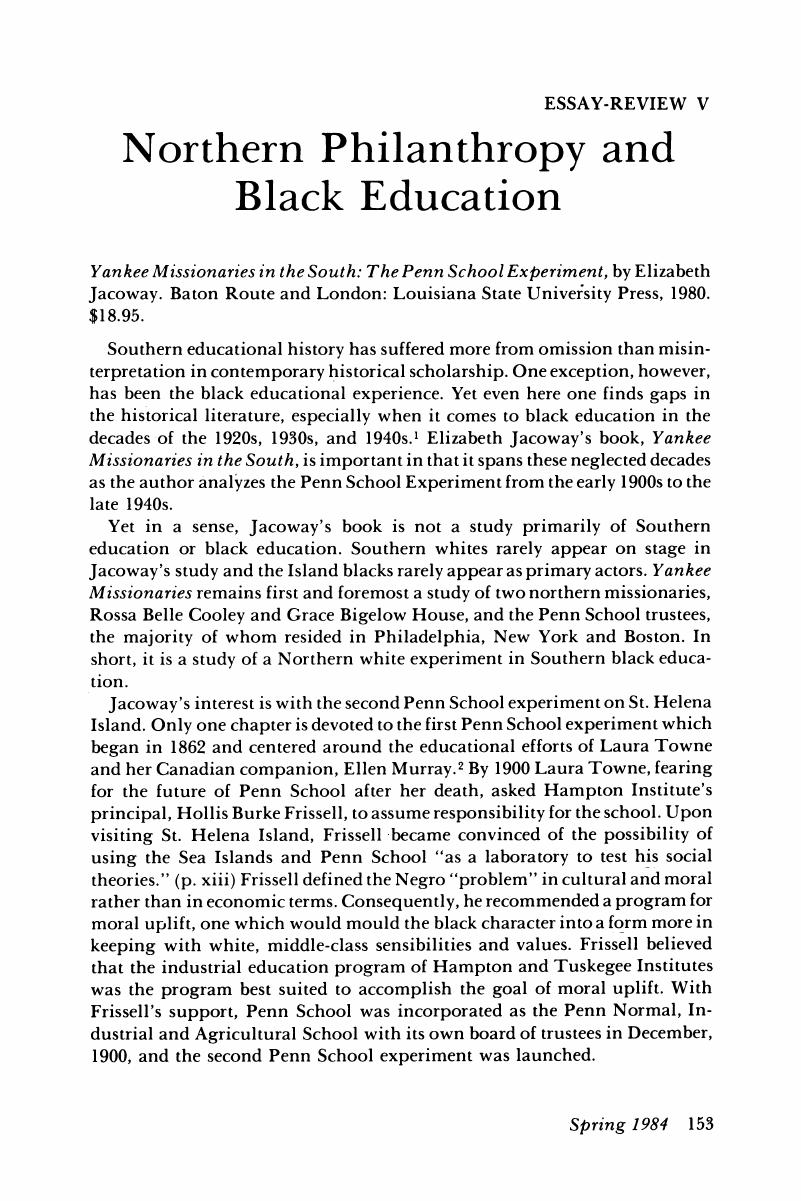Article contents
Northern Philanthropy and Black Education
Published online by Cambridge University Press: 24 February 2017
Abstract

- Type
- Essay-Reviews
- Information
- Copyright
- Copyright © 1984 by History of Education Society
References
Notes
1. Two recent articles which deal with black education in the 1920s and 1930s are Anderson, James D., “Northern Foundations and the Shaping of Southern Black Rural Education, 1902–1935”, History of Education Quarterly 18 (Winter 1978):371–96 and Grant, Nancy L., “Government Social Planning and Education for Blacks: The TVA Experience” in Education and the Rise of the New South ed. Goodenow, Ronald K. and White, Arthur O. (Boston, 1981), pp. 215–236. For a recent review on the history of southern educational history see Neufeldt, Harvey and Allison, Clinton B., “Education and the Rise of the New South: An Historiographical Essay” in Education and the Rise of the New South, ed. Goodenow, and White, , pp. 250–93.CrossRefGoogle Scholar
2. On the early establishment of the Port Royal Experiment during the Civil War see Rose, Willie Lee, Rehearsal for Reconstruction: The Port Royal Experiment (New York, 1964).Google Scholar
3. The definitive study of the Yankee schoolmarm until the mid 1960s was Swint's, Henry L., The Northern Teacher in the South, 1862–1870 (Nashville, 1941). The most derogatory stereotype of the Yankee schoolmarm was developed by Wilbur Cash in his classic study, The Mind of the South (New York, 1942), p. 137. See also Small, Sandra E., “The Yankee Schoolmarm in Freedman's Schools: An Analysis of Attitudes”, Journal of Southern History 45 (August 1979):381–84; Jones, Jacqueline, Soldiers of Light and Love: Northern Teachers and Georgia Blacks, 1865–1873 (Chapel Hill, 1980), pp. 5–7, and Neufeldt, and Allison, , “Education and the Rise of the New South”, pp. 257–58.Google Scholar
4. Neufeldt, and Allison, , “Education and the Rise of the New South”, pp. 262–65.Google Scholar
5. Ibid.; Bullock, Henry A., A History of Negro Education in the South: From 1619 to the Present (Cambridge, MA, 1967), pp. 57, 89–121; Vaughn, William P., “Partners in Segregation: Barnas Sears and the Peabody Fund”, Civil War History 10 (September 1964):260–74; Vaughn, , Schools for All: The Blacks and Public Education in the South, 1865–1877 (Lexington, KY, 1974), pp. 119–58, and Church, Robert L. and Sedlak, Michael W., Education in the United States: An Interpretive History (New York, 1976), pp. 149–50.Google Scholar
6. Anderson, James, “Education for Social Servitude: Social Purposes of Schooling in the Black South, 1870–1970” (Ph.D. dissertation, University of Illinois, 1973) and Anderson, , “Education as a Vehicle for the Manipulation of Black Workers” in Work, Technology and Education: Dissenting Essays in the Intellectual Foundations of American Education, ed. Feinberg, Walter and Rosemont, Henry (Urbana, Ill, 1975), pp. 15–50. See also Spivey, Donald P., Schooling for the New Slavery: Black Industrial Education, 1868–1915, Contributions in Afro-American and African Studies, no. 38 (Westport, Conn., 1978), see especially pp. 71–108.Google Scholar
7. Cash, , Mind of the South, p. 137; McPherson, James M., The Abolitionist Legacy: From Reconstruction to the NAACP (Princeton, 1975), pp. 143–203 and Jones, , Soldiers of Light and Love, p. 6.Google Scholar
8. Jones, , Soldiers of Light and Love, pp. 140–66, 207.Google Scholar
9. Small, , “The Yankee Schoolmarm in Freedmen's Schools”, p. 402.Google Scholar
10. On the opposition of the A.M.E. Church to extreme emotional outbursts in black worship services see Walker, Clarence E., A Rock in a Weary Land: The African Methodist Episcopal Church During the Civil War and Reconstruction (Baton Rouge, LA, 1982), pp. 23–24.Google Scholar
11. Bullock, , A History of Negro Education, see especially pp. 89–90.Google Scholar
12. The works of Anderson cited in footnote no. 6 were available prior to the time Jacoway's manuscript went to the printer. In addition, additional works which might come out after Jacoway's manuscript went to the printer are Anderson, James, “Northern Foundations and the Shaping of Southern Black Rural Education, 1902–1935” and Anderson, , “The Hampton Model of Normal School Industrial Education, 1868–1900” in New Perspectives on Black Educational History, ed. Franklin, Vincent P. and Anderson, James D. (Boston, 1978), pp. 69–96.Google Scholar
13. McPherson, , The Abolitionist Legacy, pp. 143–202.Google Scholar
14. The Transformation of the School: Progressivism in American Education, 1876–1957 (New York, 1961).Google Scholar
15. Tyack, , The One Best System: A History of American Urban Education (Cambridge, MA, 1974), see especially part IV; Feinberg, , Reason and Rhetoric: The Intellectual Foundations of 20th Century Liberal Educational Policy (New York, 1975), pp. 233–49; Karier, Violas and Spring, , Roots of Crisis: American Education in the Twentieth Century (Chicago, 1973) and Violas, , The Training of the Urban Working Class: A History of Twentieth Century American Education (Chicago, 1978).Google Scholar
16. Church, and Sedlak, , Education in the United States, pp. 192–226.Google Scholar
17. On the rediscovery of rural education in an international context see Sher, Jonathan P., ed., Rural Education in Urbanized Nations: Issues and Innovations (Boulder, CO, 1981), see especially pp. 3–90. On rural education in the South see Maxy, Spencer C., “Progressivism and Rural Education in the Deep South, 1900–1950” in Education and the Rises of the New South, ed. Goodenow, and White, , pp. 47–71.Google Scholar
18. Maxy, , “Progressivism and Rural Education in the Deep South, 1900–1950”, pp. 47–71.Google Scholar
19. Link, William, “Making the Inarticulate Speak: A Reassessment of Public Education in the Rural South, 1870–1920”, paper presented at the Conference on Education and Society in the South: A Regional Perspective, Atlanta, GA, 25–26 March 1982.Google Scholar
20. Ibid. Google Scholar
21. I am indebted to Lester Lamon, Indiana University at South Bend, for the observation that Jacoway's study dealt with a unique community.Google Scholar
- 1
- Cited by




